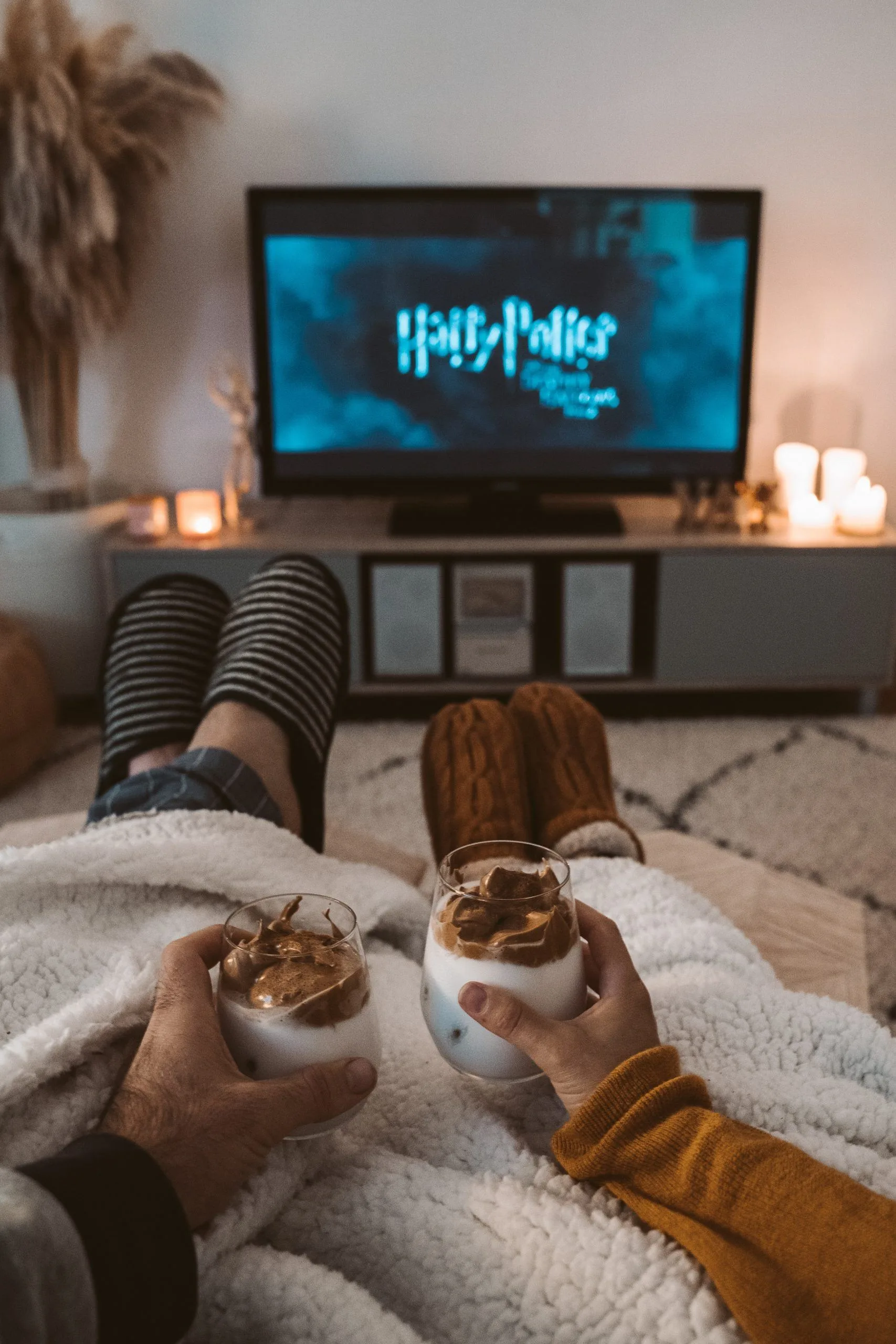Why do we seem to find so much comfort in re-watching the same movies? This isn’t only the case over the holiday season either. It seems like this may be a year-long thing. This was especially the case in 2020 when Nielsen found that we watched a massive 87 million minutes of “The Office,” which released its final season way back in 2013. But what drives us to watch certain movies or shows repeatedly? This is despite the fact that many of us have our favorite series pretty much memorized.
Our Holiday Movie Obsessions
This doesn’t only go for shows and movies

Photo by Taryn Elliott from Pexels
This also doesn’t just apply to watching TV shows or movies. In order to gain comfort, people might turn to re-reading the same books. Take Harry Potter for instance; it’s a famous series and if you’ve already read it before, especially during your childhood, it’s likely that you’ll find a safe space between the pages.
Music is also a safe space and, according to The Atlantic, musicologists estimate that for every hour of music-listening in the typical person’s lifetime, 54 minutes are spent with songs we’ve already heard. Psychologists have found that rather counterintuitively, repetition makes us more affectionate. This is also called the “mere exposure effect”. Meaning that we like something because we have seen it before. Rather than becoming bored, we find ourselves even more enamored.
Whether it’s a movie, a series, music, or a book, it’s much easier to process the second time around. It takes a lot less mental energy to process than something new would.
Re-watching movies and shows? Uncertainty and Anxiety are major contributing factors
Lucy Spicer, a London-based psychological coach, told Vogue that it’s really psychological. Essentially, when we feel anxious, we want a sense of comfort. This is likely the main reason that so many old shows like The Office and Friends experienced a major increase in watch time during the pandemic. It all comes down to uncertainty. During the pandemic, most of us experienced a lot of anxiety. We all experienced a complete lack of control over the future. As Spicer explains, most anxious thoughts are future-focused.

Photo by cottonbro from Pexels
Of course, the festive season marks the coming of the end of another year. This too brings anxiety for the future. So, what do we do? When, as during the pandemic and over the festive season, we crave security and familiarity, we return to what we know. One of the major reasons that re-watching shows and movies brings safety and security is that we already know the ending, we know what to expect. We can’t be shocked or scared by anything because we have prior knowledge.
The characters are near and dear
We know the characters as if they are close friends. This is also one of the reasons why we tend to watch old shows and movies again. Tanya Percy Vasunia, a Mumbai-based psychologist says this is essentially a method of self-soothing. You are able to use the show as a form of escapism but also be reassured by the fact that you already know what is coming up in the plot.

Photo by cottonbro from Pexels
Of course, famous shows like “Friends” also act as a sort of social currency. They are easy to bond over. Most people have watched these iconic shows, which makes them easy to use as a form of connection or even an icebreaker. These famous characters also serve as a form of self-expression, according to Vasunia. People that struggle with self-expression often adopt character traits from their favorite characters. This might include using catchphrases that align with who they are.
It’s got a lot to do with nostalgia and safety
This might include wanting to recapture a long-lost memory or feeling. In most cases, the feeling associated with particular songs, artists, movies, or books is very strong. It seems that it is actually this pull that makes us want to go back and re-experience them Clay Routledge, a psychologist who studies nostalgia at North Dakota State University explained how this works to the Atlantic. There are two types of nostalgia: nostalgia for the past (historical nostalgia) and nostalgia for your specific past (autobiographical nostalgia).

Photo by Matthias Groeneveld from Pexels
Typically, re-watching a show or movie or listening to specific songs falls into the latter of the two categories. Humans are, notoriously, inwardly focused. Routledge found in one of his studies that “subjects exposed to popular songs and lyrics from their younger days were more likely to report feeling ‘loved’ and that ‘life is worth living‘.
With shows or movies that are particularly well known, people may also want to go back and look for details and ‘easter eggs’ they might have missed the first time around. The fancy name for this, if you want to impress friends and family around the dinner table is “reconstructive consumption”.
Cold weather seems to make us more nostalgic for old movies and TV shows

Photo by Taryn Elliott from Pexels
Perhaps most interestingly, the weather may actually have something to do with it. This may explain why many of us become so nostalgic around the festive season. Nostalgia, according to a study, offers physical comfort in the form of warmth. Of course, around November each year, it starts to get cold in the Northern Hemisphere. So, if around Christmas each year, you suddenly feel the pull towards the old Harry Potter movies and your favorite childhood songs, it might very well have something to do with the weather.



![women [longevity live]](https://longevitylive.com/wp-content/uploads/2020/01/photo-of-women-walking-down-the-street-1116984-100x100.jpg)










